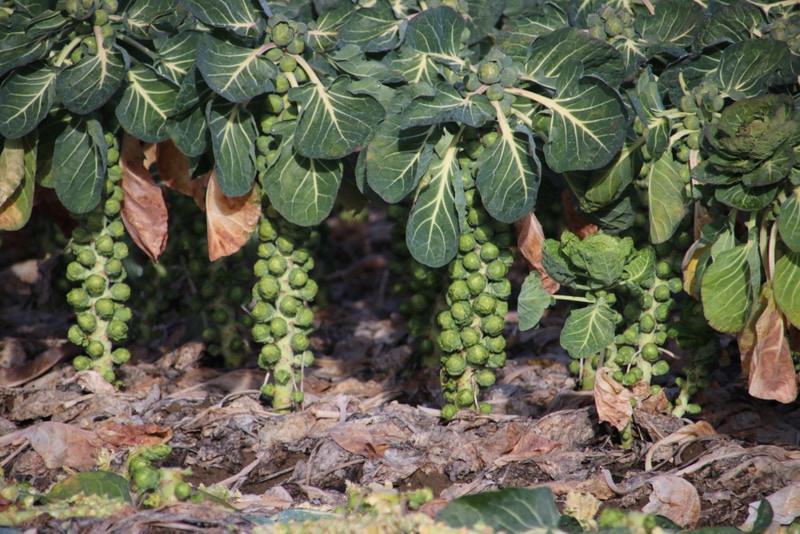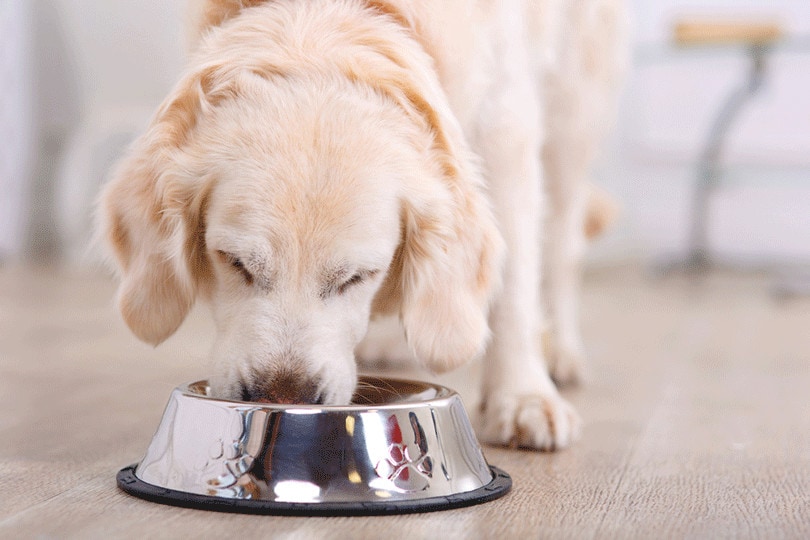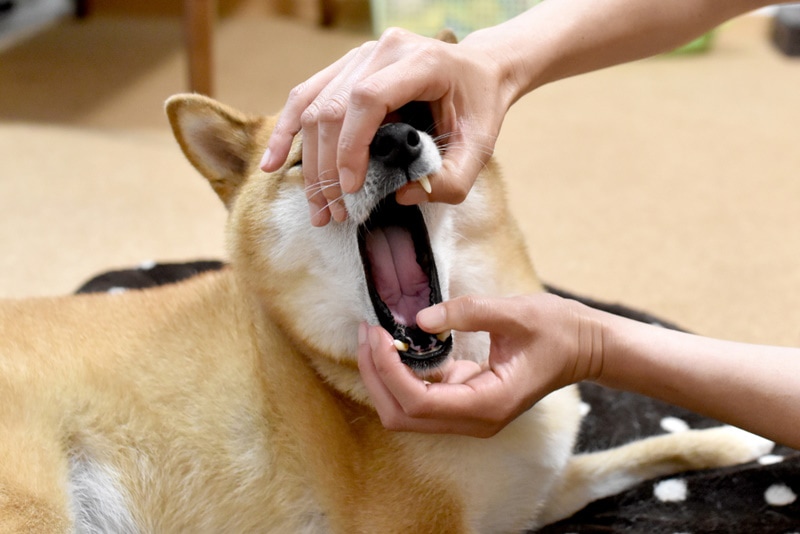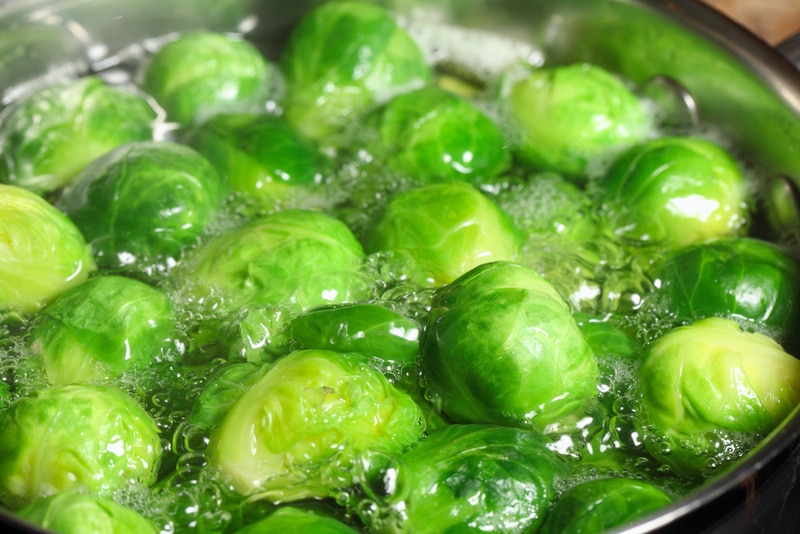Click to Skip Ahead
When it comes to Brussels sprouts, it seems that you either love ‘em or you hate them, there is no in between. There are people out there who adore this veggie and could eat them with every meal. Then again, some prefer to steer clear of Brussels sprouts and keep them completely off the menu. While you may have a strong stance when it comes to these veggies, what about your dog? Can dogs eat Brussels sprouts?
The answer to that question is yes, dogs can eat Brussels sprouts; that is, if they like them. However, there are a few guidelines you should follow if you plan to offer them to your dog, and some pungent side effects you might want to be aware of. Let’s take a deeper look at dogs and Brussels sprouts to learn the benefits of offering them to your pooch and the safety precautions you should follow.
What Are Brussels Sprouts?
If you were never forced to eat Brussels sprouts as a child, then you may not know what these small vegetables are. Basically, Brussels sprouts are tiny cabbages with a head that grows to around 1 to 2 inches in diameter. The plant itself is a cultivar of a Brassica species of vegetable, a genus of plants also known as cruciferous vegetables. This group includes cauliflower, broccoli, kale, and of course, cabbage. When mature, Brussels sprouts can be light to dark green and taste a bit earthy with some bitterness. You’ll also find if you purchase smaller Brussels sprouts, they have a sweeter taste.
For fans of Brussels sprouts, these veggies are available all year round. In the garden, you’ll find these small heads grow on tall, thick stalks. When harvested, most people cut the heads off the stalks. This is how you usually find them available in stores as well. The peak season for Brussels sprouts, which are high in valuable nutrients, is August through March, when you’ll find the larger heads.

Can Dogs Eat Brussels Sprouts?
Now that we know more about this veggie, let’s learn why Brussels sprouts are good for dogs and how to feed them to your pet safely. First off, this cruciferous vegetable is full of healthy vitamins and minerals that are beneficial to your dog. The key to providing Brussels sprouts to your pet is to only do it in moderation and to avoid adding dangerous seasonings such as garlic, onion, and salt. You’ll need to only provide fresh, plain sprouts to your pup.
Here’s a look at a few of the vitamins and minerals found in Brussels sprouts and how they can benefit your pooch.
- Vitamin A: Vitamin A is essential in your dog’s diet. This vitamin helps promote a better immune system and better vision, improves cellular reproduction, and supports your dog’s bone growth. For an adult dog, the amount of vitamin A needed in their diet is around 379 micrograms, most of which they can get from their regular dog food. But you’ll find that a cup of Brussels sprouts contains 33.4 micrograms of this essential vitamin.
- Vitamin B1: Vitamin B1, or thiamine, is essential for a dog’s metabolism. Its job is to help metabolize carbs and help your pet use energy. It also helps with neuron activation in dogs.
- Vitamin B6: Vitamin B6 is an extremely important vitamin in your dog’s diet. This vitamin helps make and use glucose, promotes healthy nervous system function, assists in regulating your dog’s immune system and hormones, supports red blood cell production, and activates certain genes in your dog’s body.
- Vitamin C: Vitamin C is great for dogs as it is an antioxidant. Antioxidants are essential for fighting free radicals in the body that cause damage to cells and lead to certain forms of cancer. Luckily, dogs can synthesize vitamin C inside their livers, but a cup of Brussels sprouts provides your dog with an additional 74.8 mcg of vitamin C.
- Vitamin K: Brussels sprouts are high in vitamin K. This vitamin is essential for your pooch’s blood as it helps it to clot properly. One cup of Brussels sprouts offers your dog 158 mcg. Your dog’s recommended daily intake of vitamin K is 0.41 mcg.
- Potassium: Potassium is essential for your pet’s nervous and muscular systems. Dogs need around 1 gram of potassium daily for good health. One cup of Brussels sprouts contains 342 mcg.
- Fiber: We all know the importance of fiber in a dog’s diet. A good amount of fiber helps promote better stool quality in dogs and supports the digestive system. Brussels sprouts are high in fiber and therefore will help with these issues as well.

The Dangers of Brussels Sprouts for Dogs
As we mentioned, if you feed your dog Brussels sprouts, it should only be done in moderation. There are several reasons why this is the case. Let’s take a look at those below.
Gas and Bloating
Possibly the biggest downside of Brussels sprouts is the gas it can cause your pooch. Brussels sprouts contain Raffinose, a complex sugar that dogs struggle to digest completely. This sends it to your dog’s intestines, where bacteria waiting there helps break the food down. This also causes quite a bit of gas. While you and the rest of the family won’t be loving the smell, flatulence isn’t a bad thing for your pup. However, lots of gas can be uncomfortable, and trapped wind can be extremely painful. There have been many a painful pooch that have wound up on an x-ray table due to painful trapped gas. You may also notice diarrhea and vomiting due to this. If a dog becomes too gassy and bloated, reaching out to a veterinarian could be necessary.
PangoVet. It’s an online service where you can <b>talk to a vet online</b> and get the personalized advice you need for your pet — all at an affordable price!
</p>
<div class="su-button-center"><a href=https://www.dogster.com/dog-nutrition/"https://pangovet.com/?utm_source=dogster&utm_medium=article&utm_campaign=dog_eat_drink%22 class="su-button su-button-style-default" style="color:#FFFFFF;background-color:#FF6600;border-color:#cc5200;border-radius:9px;-moz-border-radius:9px;-webkit-border-radius:9px" target="_blank" rel="nofollow"><span style="color:#FFFFFF;padding:0px 24px;font-size:18px;line-height:36px;border-color:#ff944d;border-radius:9px;-moz-border-radius:9px;-webkit-border-radius:9px;text-shadow:none;-moz-text-shadow:none;-webkit-text-shadow:none"> Click to Speak With a Vet</span></a></div></div></div>"}" data-sheets-userformat="{"2":513,"3":{"1":0},"12":0}"> If you need to speak with a vet but can’t get to one, head over to PangoVet. It’s an online service where you can talk to a vet online and get the personalized advice you need for your pet — all at an affordable price!

Choking and Obstructions
A small Brussels sprout could be a choking hazard, but it would be rare. If your dog were to eat a lot of sprouts, however, there is a risk of them forming an obstruction as the stomach tries to break down all that fiber. As with anything, moderation is key.
If you are worried that your dog may have overdone it on the sprouts, try to get them to drink water, little and often. This can help keep them moving.

How Do I Feed Brussels Sprouts to My Dog?
Knowing all of the good inside a Brussels sprout, it’s only natural to want to offer your dog a few here and there. This leads to questioning how to properly prepare this veggie for your pooch. Here’s a quick look at what you should keep in mind when giving your dog this tasty vegetable.
- Always start with a small amount of Brussels sprouts.
- Never feed raw or frozen Brussels sprouts to your pooch – steamed or blanched is the best way to soften them a little, without losing the good stuff.
- Do not add seasonings such as garlic, salt, or onions.
- Always watch your dog’s reactions when feeding them something new for the first time.

Final Thoughts
As you can see, Brussels sprouts are a very nutritious vegetable to add to your dog’s diet. The key, however, is moderation. If you’re always looking for something new for your dog to try, this veggie is a great option. Just be prepared: Not every dog is going to enjoy Brussels sprouts and serious gassiness is a real issue for your pets with this vegetable. If you can tolerate the smelly side effects, let your pooch reap the benefits of a few Brussels sprouts here and there, just don’t do it before a long car journey!
Featured Image Credit: Denis Tabler, Shutterstock











